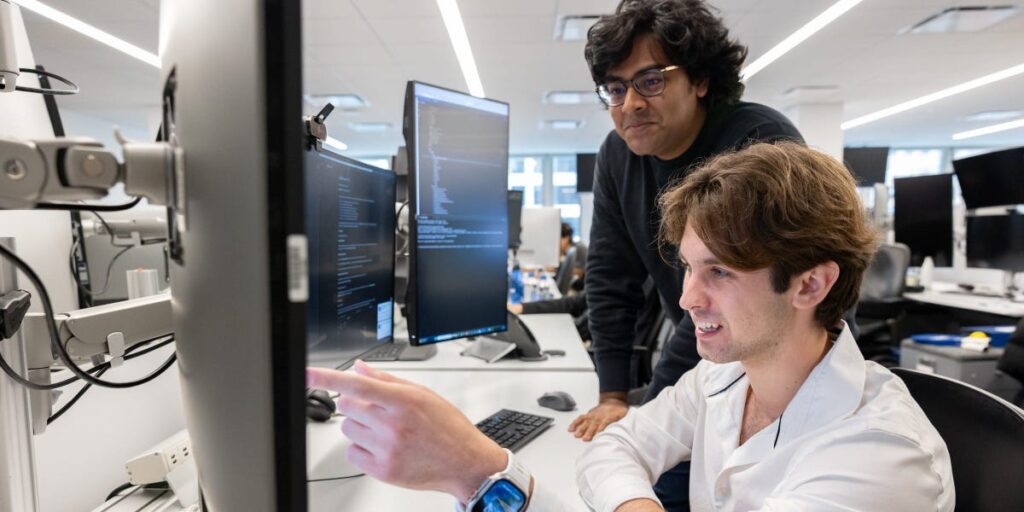Dana Melillo knows the importance of a first impression.
As Citadel’s global head of engineering talent acquisition and early careers, Melillo has spent the past few years trying to set the tone for engineers joining the firm and create an environment that will retain tech talent.
“We want to position everyone who joins the firm for success from day one,” Melillo told Business Insider.
For Melillo, that meant designing a two-week program for the few dozen newly hired engineers to arm them with the tools, knowledge, and connections they need to make it in the competitive world of finance. And there’s perhaps no better place to be introduced to Wall Street than at Citadel, Ken Griffin’s $63 billion hedge fund that manages money for large investors, like pension funds.
The program is geared at early-career engineers, most of whom graduated only a few months ago. These engineers will help build and maintain the different systems and tools that make Citadel run, whether managing the cloud-compute infrastructure used across the firm or developing tools for specific trading desks. The program involves hands-on training on Citadel’s technology stack and finance fundamentals, Q&As and fireside chats with c-suites, and networking opportunities.
“We put them in an environment where they’ll be challenged, where they can fail, and where they can learn from those failures,” Paulo Rodela, a managing director at Citadel and head of post-trade engineering, told BI. Rodela teaches recruits about the lifecycle of a trade and often absorbs a lot of the young talent into his division.
In an effort to bring readers inside the firm’s two-week onboarding program, BI spoke with two recently hired engineers, in addition to Melillo and Rodela, about their experience. They outlined the program’s three main pillars, which involve a crash course on financial markets, a simulated trading competition, and speed networking.
Simulated trading competitions instill a commercial mindset in everyone
During his first week on the job, Justin Milushev made simulated trades and managed tens of millions of hypothetical dollars as part of a competition.
The contest capped off an intensive week of financial markets training. During this week, they learned finance fundamentals, such as options strategies that minimize market exposure and interest rate swaps. They put their knowledge to the test during this two-hour contest. New hires were split into teams of three to write code that systematically made trades based on hypothetical market events, like if interest rates go up in the US.
“It was really cool to move from starting off manually to creating real systematic trades at the end — just like we do at the firm with much more complexity,” Milushev, who only graduated from the University of Texas at Austin a few months ago, told BI.
It might be unconventional for Milushev, an accounting engineer, to be trained to make investment decisions usually left to portfolio managers. But at Citadel, everyone is expected to operate with a business-first mindset.
“We talk about the importance of being driven, commercially oriented, and understanding the business,” Rodela said. “There is no room here for someone to just stay high level, they need to get into details of the business and the technology solution.”
The assignment is designed to build muscle memory around “understanding a business problem, breaking it down into simpler parts, sorting out how to solve it, and then using technology or code to automate the repeatable parts of the process,” Melillo added.
Getting up to speed technologically
The second week of onboarding aims to get engineers up to speed on Citadel’s universe of technology platforms and tooling. Much of the technical training is carried out by the Citadel X team, a group of engineers that builds customized technology and tooling for the fund’s businesses.
This year, Citadel X introduced a new team component, distinct from previous years, that focused mostly on individual assignments. New hires were divided into teams building an app backed by an imaginary exchange where users could buy and sell securities.
Each team had a lead responsible for assigning and coordinating the deliverables and putting the finished product together. Melillo said the project is close to what an actual engineering project may look like.
Networking and building connections are key
Milushev just wrapped up his two-week onboarding in late July. Now, he’s moving to the next phase of his Citadel onboarding journey, which spans some two years and involves meeting with company leaders and other early-career engineers at networking events.
One such example is a speed networking event, which allows new hires to meet Citadel engineers with a few more years of experience and ask them questions about protecting work-life balance and getting ahead.
Cindy Zhang, a software engineer working on Citadel’s cloud platform, just passed her two-year mark at Citadel. As a program alum, she helps mentor newer engineers through the Early Careers program.
“They do a really good job at building community and getting you introduced to various parts of the firm,” Zhang said. Citadel hosts casual team events for those engineers, giving them “time and space to hang out and get to know each other,” she added.
Zhang mentors three newly hired engineers from Milushev’s class, which is mutually beneficial, she said.
“It’s also helpful for me because it also gives me a chance to reflect on my own career and what has gone well, what I wish I’d done differently, and share that to hopefully help someone else,” she said.
Read the full article here
















